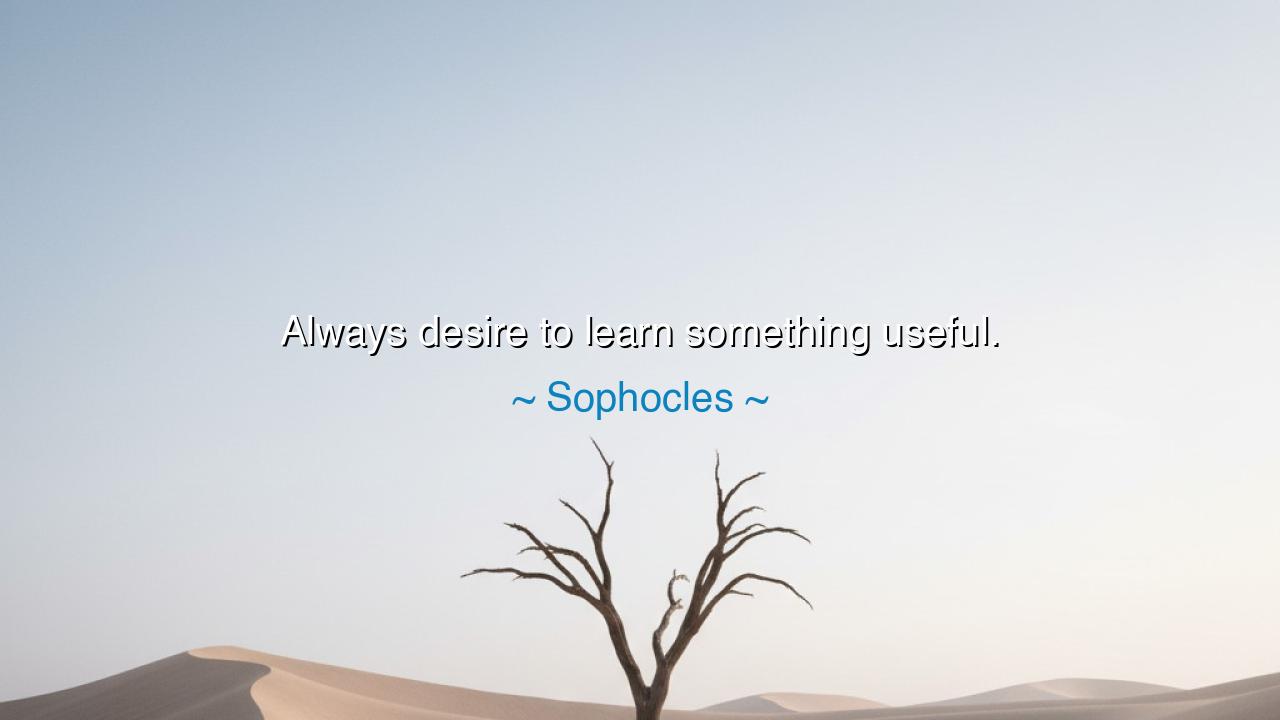
Always desire to learn something useful.






Hear, O disciple of wisdom, the ancient words of Sophocles, the tragedian of Athens whose voice still echoes through the centuries: “Always desire to learn something useful.” This teaching, though spoken in a distant age, shines with a light undimmed by time. For the pursuit of knowledge is the crown of man, but knowledge without purpose is like a sword left to rust or a lamp hidden beneath the earth. What matters is not to know many things, but to know the things that serve life, uplift the spirit, and strengthen the common good.
To learn something useful is to shape the mind into a tool for action, not merely a chamber for idle thought. The Greeks, who raised temples of reason and art, understood that wisdom was not an ornament but a guide. Sophocles, who wrote of kings undone by pride and mortals entangled in fate, had seen how empty learning can lead to ruin when it does not serve virtue. Thus he counseled men not merely to learn, but to seek the kind of learning that builds, heals, and liberates.
Consider the tale of Benjamin Franklin, born with little wealth and no noble title. He could have spent his days in ordinary labor, but he hungered always to learn something useful. He studied printing to earn his bread, then mastered science, inventing tools for daily life—the lightning rod to protect homes, the stove to warm the poor. His learning was not idle curiosity but service, and through it he became not only a man of knowledge but a father of his nation.
So too in the life of Florence Nightingale, who as a young woman yearned for more than polite society’s chatter. She studied medicine and sanitation when such matters were deemed unfit for her sex. Yet in the Crimean War, her useful knowledge saved countless lives. She turned learning into healing, study into salvation, and her lamp became a symbol of compassion enlightened by wisdom. Her life bears out the truth of Sophocles’ words: that knowledge becomes divine when it serves others.
The meaning is plain: knowledge without application is like water that never reaches the roots of the tree. Many fill their minds with facts to boast or to argue, but such vanity feeds neither themselves nor the world. True wisdom seeks what is useful—what nourishes, what protects, what guides a man to live nobly and to aid his fellows. For usefulness does not diminish the beauty of learning; it elevates it, giving knowledge a body and a soul.
O listener, take this teaching into your daily path. Let your hunger for knowledge be unending, but let it be directed toward the good. Learn skills that build rather than destroy, words that heal rather than wound, truths that strengthen rather than enslave. Ask of every lesson: “How will this serve? Whom will this help? What fruit will it bear?” In this way, your learning will not vanish like smoke but will endure like stone.
Therefore let this be your charge: Always desire to learn something useful. Seek wisdom not for pride, but for service; not for vanity, but for life. In doing so, you will walk in the company of sages, inventors, healers, and leaders whose legacy endures because their learning was not idle, but fruitful. And thus your life too will become a lamp to others, shining with the light of knowledge that blesses the world.






AAdministratorAdministrator
Welcome, honored guests. Please leave a comment, we will respond soon